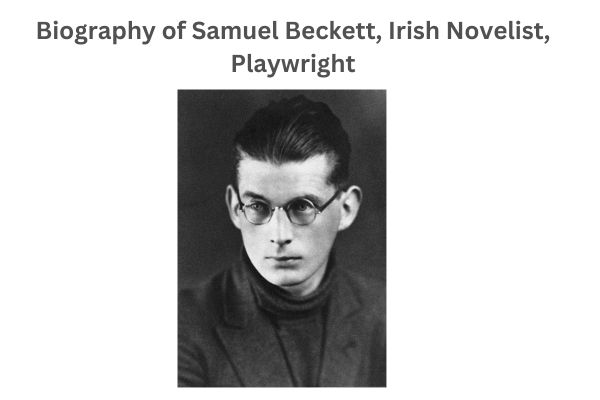Samuel Beckett, a towering figure in 20th-century literature, is renowned for his profound exploration of existential themes, the human condition, and the absurdity of existence. Born on April 13, 1906, in Dublin, Ireland, Beckett’s life and works continue to captivate readers and scholars alike, leaving an indelible mark on the literary landscape.
Samuel Beckett’s Early Life and Education:
Samuel Beckett was born into a middle-class Protestant family, the second son of William Frank Beckett and Maria Jones Roe. He attended Portora Royal School in Enniskillen before moving on to Trinity College, Dublin, where he studied French, Italian, and English literature. His academic pursuits introduced him to the works of Dante, Racine, and other European literary giants, foreshadowing his own future contributions to the literary canon.
Parisian Sojourn and Influences:
After completing his studies at Trinity College, Samuel Beckett moved to Paris in 1928, a city that would become his spiritual and artistic home. In Paris, he encountered the influential Irish writer James Joyce, whose experimental style and linguistic innovations profoundly influenced Samuel Beckett’s own literary endeavors. Beckett worked as Joyce’s assistant, aiding him in the completion of “Finnegans Wake,” while also immersing himself in the vibrant artistic and intellectual milieu of the city.
Samuel Beckett’s Literary Beginnings:
Samuel Beckett’s early literary efforts, including his first novel “Dream of Fair to Middling Women” and his collection of poems “Echo’s Bones,” showcased his burgeoning talent and intellectual curiosity. However, it was with the publication of his first major work, “Murphy” in 1938, that Beckett began to garner attention as a writer of note. “Murphy” foreshadowed many of the themes and stylistic elements that would come to define Beckett’s oeuvre, including the exploration of human consciousness, the absurdity of existence, and the search for meaning in a seemingly meaningless world.
World War II and the Resistance:
During World War II, Samuel Beckett joined the French Resistance, working as a courier and translator for the underground movement. His experiences during this tumultuous period would profoundly shape his later works, infusing them with a sense of existential angst and moral ambiguity.
The Trilogy:
Following the war, Samuel Beckett embarked on his most ambitious literary project, the Trilogy comprised of “Molloy” (1951), “Malone Dies” (1951), and “The Unnamable” (1953). The Trilogy represents the pinnacle of Beckett’s experimentation with language, narrative structure, and existential themes. These works eschew traditional plot and characterization in favor of a fragmented, stream-of-consciousness style that immerses the reader in the inner lives of the protagonists as they grapple with the futility of existence and the impossibility of communication.
“Waiting for Godot”:
In 1953, Samuel Beckett achieved international acclaim with the premiere of his seminal play “Waiting for Godot.” A masterpiece of absurdist theater, “Waiting for Godot” follows the meandering conversations and existential musings of two tramps, Vladimir and Estragon, as they await the arrival of the enigmatic Godot. The play’s minimalist setting, circular dialogue, and existential themes captured the zeitgeist of post-war Europe, earning Beckett a place among the literary avant-garde and solidifying his reputation as one of the preeminent playwrights of his generation.
Later Works and Nobel Prize:
Samuel Beckett continued to push the boundaries of literature with works like “Endgame” (1957), “Krapp’s Last Tape” (1958), and “Happy Days” (1961), each exploring the absurdity of human existence with unparalleled insight and wit. Nobel Prize in Literature given to Beckett in 1969 for his “writing, which—in new forms for the novel and drama—in the destitution of modern man acquires its elevation.” The Nobel Committee’s recognition cemented Beckett’s status as a literary luminary and ensured his place in the pantheon of great writers.
Legacy and Influence:
Samuel Beckett’s influence extends far beyond the realm of literature, permeating art, philosophy, and popular culture. His uncompromising exploration of existential themes and the human condition continues to resonate with readers and audiences worldwide, inspiring generations of writers, artists, and thinkers to confront the absurdity of existence with courage and humor.
Conclusion:
In the annals of literary history, few figures loom as large as Samuel Beckett. His life and works stand as a testament to the power of language, imagination, and intellect to illuminate the darkest corners of the human soul. As we reflect on Samuel Beckett’s legacy, we are reminded of the enduring relevance of his words and ideas in an ever-changing world, where the search for meaning and identity remains an eternal quest.
Read Also: British Literature
